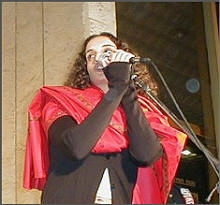|

Uri Avnery
/ 19.02.02
Uri Avnery / 16.2.02
Vortrag von Uri Avnery:
Perspektiven des Nahost-Friedensprozesses
Der Publizist und Gründer
der Friedensbewegung Gush
Shalom, Träger des Alternativen Nobelpreises 2001, spricht in
Potsdam...
Soundfile 25min
RealAudio: Erlebte Geschichte WDR V [Uri
Avnery]
Something is Moving
I once saw in a Western a Red
Indian (or should I say a Native American?) putting his ear to the
ground and hearing a train tens of miles away.
In the course of the years I have
tried to imitate that Indian. I try to hear changes in the public mood
long before they appear on the surface. Not to prophesy, not to guess,
just to hear.
Now I perceive the approach of a
great wave of opposition to the bloody war against the Palestinians
(nicknamed “Peace of the Settlements, following the name given to the
1982 invasion of Lebanon, “Peace of Galilee”). The revolt of the
soldiers who refuse to serve in the occupied Palestinian territories is
an important symptom, one of many.
We have seen in the past several
such public upheavals, that start with opaque noises and grow quickly
into a public uproar. Such a wave rose during the Lavon affair in the
50s and led to the dismissal of Ben-Gurion. Such a wave carried Moshe
Dayan into the Defense Ministry on the eve of the 1967 Six-Day War (led
by the women nicknamed “the Merry Women of Windsor”), and the next one,
which swept him and Golda Meir away after the Yom Kippur war. Such a
wave got the IDF out of Beirut, and later out of South Lebanon (led by
the “Four Mothers” movement.)
The mechanism can be compared to a
transmission of spiked wheels. A small wheel with a strong, independent
drive turns a bigger wheel, which in turn moves an even bigger wheel,
and so on, until all the establishment changes course. This is how it
happens in Israel, this is how it happens in all democracies (see:
Vietnam).
It always starts with a small
group of committed people. They raise their feeble voice. The media
ignore them, the politicians laugh at them (“a tiny, marginal and
vociferous group”), the respectable parties and the established old
organizations crinkle their noses and distance themselves from their
“radical slogans”.
But slowly they start to have an
impact. People leave the respectable (meaning linked to the
establishment) organizations and join the fighting groups. This compels
the leaders of the organizations to radicalize their slogans and to join
the wave. The message spreads throughout the parties. Politicians who
want to be reelected adopt the new slogans. “Important” journalists,
serving as weathercocks, smell the change and adapt themselves in time
to the new winds.
The famous anthropologist Margaret
Mead said about this: “Never doubt that a small group of thoughtful,
committed citizens can change the world. Indeed, it’s the only thing
that ever has.” And the German philosopher, Arthur Schopenhauer,
said: “All truth passes through three stages. First, it is ridiculed.
Second, it is violently opposed. Third, it is accepted as self-evident.”
Now it happens again. It is
difficult to fix the exact moment when it started. Perhaps after the
demolition of some 50 homes in the Rafah refugee camp. Or at the
mass-meeting called by Gush Shalom in Tel-Aviv, when
Colonel Yig’al Shochat, who had lost a leg in the Yom Kippur
war, called upon his comrades, the airforce pilots, to refuse to execute
orders that are manifestly illegal, such as bombing Palestinian towns,
and when the philosopher Adi Ophir proposed to open files on IDF
officers who commit war crimes. Suddenly the public woke up to the
possibility that war crimes are being committed in its name. The mental
block was broken, a public debate about war crimes, and consequently
about the occupation itself, began.
The announcement by
50 reserve officers and soldiers that they refuse to serve in
the occupied territories broke a dam. The number of refuseniks
grew quickly, the phenomenon shook the military-political establishment.
For the first time, the leaders of the establishment saw in their
nightmares the possibility of a big uprising of soldiers who say: This
is where we stop, we will not go on. When
public
opinion polls showed that nearly a third of the Jewish public
supports the refuseniks, the panic grew. At the same time, hundreds of
Israelis visited the besieged Yasser Arafat in Ramallah.
Then came the big, joint
demonstration of the militant peace movements (“The
Occupation Kills All Of Us!”) in Tel-Aviv’s Museum Square.
Organizations that had got used during the last 16 months to
demonstrations of a hundred, two hundred people saw before them ten
thousand enthusiastic demonstrators, who have left despair behind them
and were demanding action.
This demonstration had, of course,
an impact on the “established left”, which is now compelled to confront
the new mood of their own public.
This is the beginning of a
process. Nobody can know yet how powerful it will become and how far it
will go. But one thing is certain: something is happening.

 |
Der Duft des Aufbruchs liegt in
der Luft:
Hunderte, Tausende und mehr
Die israelische Friedensbewegung teilt sich,
um zu siegen...
Der Frieden ist eine Existenzfrage:
In einem zersplitterten Land
Proklamierte Friedenswilligkeit bedeutet
noch lange nicht wirkliche Friedensbereitschaft, und es ist zu
fürchten, dass große Teile der israelischen Gesellschaft sich über
diesen Zusammenhang noch nicht klar geworden sind...
Wenn Ihr es wollt, ist es kein Traum:
... but I'm not the only one!
Tausende demonstrieren in Tel Aviv für ein
Ende der Besatzung...
The rally was a good one:
The Square was full of People
Von allen hervorragenden Reden an diesem
Abend, war die von Yishai Rosen-Tzvi die eindrucksvollste: "Es gibt
Dinge, die ein anständiger Mensch nicht tut"...
To discus this article:
hagalil.com/forum
haGalil onLine 08-02-2002
|
|